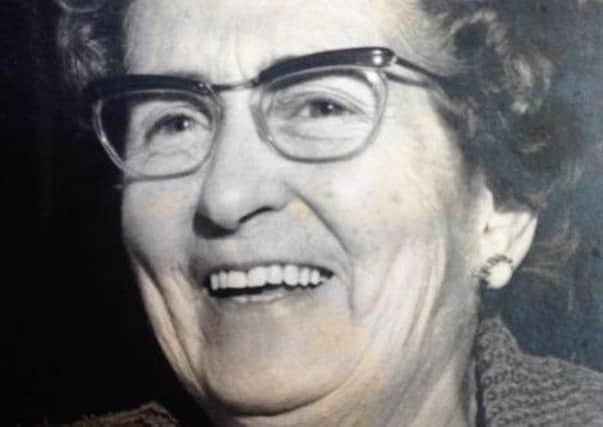Blue plaque to honour Shankill lady who fought for women's rights


The plaque will be unveiled by Baroness May Blood on behalf of the Ulster History Circle at 11.30am at Shankill Road Methodist Church.
Saidie Patterson was born in 1904 and lived her whole life in Woodvale Street.
Advertisement
Hide AdAdvertisement
Hide AdAs a child she helped her mother – an outworker in the linen industry – which made her aware of the exhaustion and poverty suffered by such workers. Her sense of this injustice was exacerbated by the death of her mother in childbirth in 1918. Her mother had been unable to afford a doctor’s fee of 3s 6d.
When Saidie went to work at Ewart’s Mill on the Crumlin Road at the age of 14, she was keen to alleviate the poor conditions in which her fellow workers toiled.
Her challenges to authority slowly gained the women’s confidence and, conscious of the difficulties in organising female trade unions, she sought the co-operation of male trade union and socialist leaders.
It was with their encouragement and the promised support of the Transport Union that she called for the full unionisation of Ewart’s workforce in 1940, calling a strike when this was rejected.
Advertisement
Hide AdAdvertisement
Hide AdAlmost 2,000 workers joined the strike, which lasted for seven weeks, with the sight of these women parading through Belfast in their Sunday best leaving a lasting impression.
The benefits of this show of solidarity may not have been immediately realised, but wage increases, sickness and holiday pay were introduced by the end of the year.
Her leadership skills were acknowledged in her appointment as the first full-time official of the textile branch of the Transport and General Workers’ Union in Belfast, with special responsibility for women workers – a post she held for 20 years.
Her interest in social welfare went beyond the workplace and as a member of the Girls Club Union for over 50 years, she brought girls from the Falls and Shankill together to join in a range of activities.
Advertisement
Hide AdAdvertisement
Hide AdThe Standing Conference of Women’s Organisations – formed in 1943 to bring 35 women’s groups together and of which she was treasurer – also provided opportunities to exercise her particular brand of Christian socialism.
Saidie broadened her horizons by her association with the Moral Rearmament Association which convinced her that only through personal relationships could reconciliation – between any opposing factions – be brought about.
In 1973 she became chair of Women Together which provided shared holidays for the segregated children of Belfast.
She went on to play an important role in the work of the Peace People, at one point organising a march of 50,000 women between the Falls and the Shankill.
Advertisement
Hide AdAdvertisement
Hide AdSaidie received five international peace awards, donating the money received to charities, and at the age of 69 she was presented with the World Methodist Peace Award.
She died in 1985, aged 81.
Vice-chairman of the Ulster History Circle, Dr Myrtle Hill, said: “The Ulster History Circle is delighted to honour this local woman who has played such a prominent role in our history. Her commitment to fairness and equality in the workplace, and to the promotion of peace in our most troubled times make her a particularly important role model to be celebrated on International Women’s Day.”